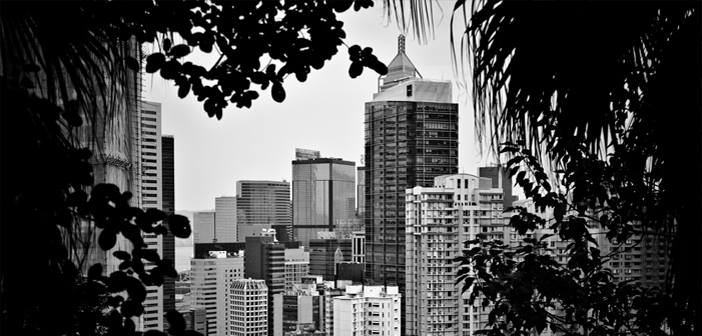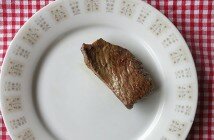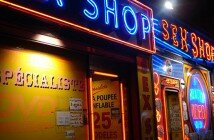Our second day back in town, we forage in Josh’s family’s old barns for salvageable furniture. His aunts and uncles mill around us, a flock of birds picking at the crumbs of our shame. There are fifteen of them, all living within his grandparent’s ten acre lot, “the compound.” They ask us how we’ve been all these years, even though they’ve been told, but they want to hear it from our lips, make us repeat out loud that we didn’t make it as musicians, that we’ve come back from rehab, that we’re broke, that we’re sorry. In return, they tell us small things, like Josh’s Grandma’s gone half-deaf since we left, the nephews now play baseball, the price of electric is cheaper than gas, and Silas, the half-lab mutt they let run wild around the compound has been missing since this morning. Grandma just loves that dog, they say. But you, they insist, how about you two?
We’ve been in the city, we say.
Oh, they say, the city. There is such sadness in their voices that you would have thought we’d gone into the underworld to bring a loved one back and failed. Which is what we’d tried to do, all us kids from upstate who’d gone to the city to fulfill some flat, vibrant, cartoon dream and got sucked into other things instead. But we’re not kids anymore, and we’re back as prodigals. Back in Fairhaven, and our relatives shake their heads at our failure like they’re half glad. The people we knew in high school who never got out, know they have something over us, finally. A cousin of Josh who we always thought was too simple lets us stay for a pittance in his spare, rundown cabin across the lake while it sells and, as he calls it, we get back on our feet. There hasn’t been running water for years, termites crawl over the walls and the basement stinks like it knows this town’s whole history, but it’s the only place the relatives say they have room. Josh’s father won’t even speak to us, since the last time we asked him for money, and he asked us what we’d done with the inheritance from Josh’s mother’s death, and we called him small-town. The truth was the money had disappeared into our bodies like sand slipping through fingers.
The aunts unfold the tables and the tailgate chairs, the older cousins bring lemons to halve and gut and bowls of sugar. They make it a party, this foraging and this shame. The nephews and nieces wander over the grass and call, Silas, Silas, for the dog to come back. The big men of the family join us in our procession across the lawns to beg for furniture from house to house. It almost feels like trick-or-treating years ago, except now we are nothing behind our masks. In the basements and attics, the uncles lift useless, rotting junk out of our way as we tiptoe around fallen beams and insulation, yellow and red on the walls like flesh between ribs ripped open. The ancient furniture is covered in spider webs and dead lady bugs shells, upside down like thousands of tiny, empty cups. Josh tries to hold my hand, but our hands are covered in dust and old fiberglass.
*
Josh’s great-uncle pulls sofas that smell like mildew and piss out of his shed. My chest constricts in this new, doomed life. The great-uncle asks us if we’ll take a sofa.
Josh says, we’ll take anything.
Lady bug shells and dried wasp nests fall from the cushions as the uncles balance both sofas into an aunt’s truck.
Supposedly, all has been forgiven. We are not on pills or coke or heroin this time, and the world seems dead. The relatives whisper to themselves, I’m sure about how Josh has dark circles under his eyes and is skinny as hell, and we look aged to forty years even though we’re not even thirty. As we pass they stir their lemonade glasses with their straws and talk loudly about Silas as if that’s what they were discussing all along. It’s grandma’s own fault, one cousin says, for letting that dog run free and wild.
On our way to Aunt Billy’s house, the procession traipses in front of Josh’s grandmother’s porch, where she sways on a rocking chair. You know, she calls to us, I remember that last night you both played at the restaurant. You were both so lovely. I don’t know why they didn’t just sign you right on to a record in the city.
I remember that night, the last time we played in town before touring low-paying gigs around the state, when Josh played his guitar and I sang these slow songs that moved the town to tears. Then Josh’s father and some high school friends congratulated us on our “wonderful hobby,” and asked Josh when he’d be going to work at his dad’s canvas shop and would they see me that Monday at the register of the Big M grocery store again. The night we promised ourselves that we would never come back. Now we’ve lost everything. Josh sold all of his guitars, and I know the one thing he holds over me is that I can’t sell my voice. The procession of relatives is silent and tense, remembering.
Aunt Billy changes the subject. Did I ever tell you, she says, how we had an infestation of skunks since you two left? Last year, grandma called the one living under her porch her pet skunk.
Everyone chuckles awkwardly, but I want to throw up on Aunt Billy’s garden path. An old snail shell, curled in on itself and empty, shatters under my feet. In the basement, we pull out an old mattress, two child sleeping bags decorated with cartoon dogs, and a box spring, the old cloth disintegrating and melting off the frame into our dusty hands.
We enter Josh’s parents’ house to find his father sitting on the couch, arms crossed. I remember when I told him we didn’t have the inheritance, and he guessed we’d blown it on drugs, the way his voice shook. Everything your mother gave you, he said to Josh. Now, his eyes travel down to our shaking hands. If I could still feel, shame would have filled me like the ocean in a bucket. He stays on the couch while the procession climbs into his attic. Josh chooses a table and a mason jar from underneath a pile of board games and children’s clothes, his and his brother’s from their youth. We push them off to the floor. The uncles lift one corner of the table free of the piles. I balance on the rafters, the edges dull under my feet.
Wait, we hear behind us. Josh’s father is climbing up the stairs. You can’t take that, he says.
Dad, Josh says, you haven’t used those things since I was little.
But we might, his father says. We started using that table outside on the porch when there’s company. And that jar is fragile. It shouldn’t be used. It’s made of glass.
The uncles set the table back down.
What about that lamp? An uncle asks.
Not that either.
Everyone tenses. The room is hot and stuffy, filled with lifeless things. I catch Josh’s father turning the flashlight from his dim attic into our eyes to check our pupils for drugs. I feel like I’m being pulled somewhere deep and dark in the second the flashlight flicks away. I can see it on Josh’s face too.
On to the next house, Aunt Billy says with mock triumph.
Wait, his father says, here. He grabs the neck of something out of a heap. It’s Josh’s first guitar, the back collapsed and cracked like an eggshell, missing three of its six strings. It can barely play a simple tune.
No, Josh says, keep it.
If you don’t take it, I’m putting it in the dump. Take the guitar. Don’t say I never gave you anything.
His father shoves the guitar into my arms and pushes me down the stairs. I set the guitar down by the front door as we exit, and then our hands are empty.
The next aunt and uncle, inspired, refuse us a look in their shed.
In the quiet of his sister-in-law’s barn, where we pull out chairs with covers stained with mold, ladybug shells crunch under our feet like firecrackers trying to wake the dead.
The last house on the round is his grandmother’s, where Aunt Billy says there is a rickety table to go with the rotting chairs. As we creak up the old porch, I hear a whining under my feet.
Hold on, I say.
His grandmother, rocking on the porch, holds her hands to her ears. What, she asks.
I yell, you’ve got animals under your porch.
Probably a skunk, Aunt Billy says.
I get down on all fours. There’s blood smeared on the painted lattice of the crawl space. Beyond that, in the shadows, an animal whines.
I think it’s a dog, I say.
What? Josh’s grandma yells, cupping sound to her ears.
Don’t tell her— Billy tries to stop him.
It’s a dog, Josh yells.
Grandma struggles off her rocker. Oh, Silas, oh, Silas is back.
I think he’s hurt, I say.
Grandma calls him out, but he won’t come, just whines like a piercing flute. The lemonade stand brigade joins the commotion to drag Silas out.
When Silas is out in the sunlight, we can all see his hind legs are both broken and his guts are pushed way up into his lungs. His pancake-flat stomach glistens with fresh blood. Mud is ground into his hind legs where the bones stick out in splinters. As they move him, the whining gets louder like a song and his guts slip out and sag and sway under his stomach. We can all see he’s going to die. On the other side of the porch runs the trail where he’s dragged himself from the road. Ants and crickets slide their feelers over the red, wet grass.
Uncle Steve, the same uncle who refused us scraps from his shed, says, that dog dragged himself there under that porch to die where he knew.
Stupid dog, I whisper.
We should shoot him, Uncle Steve says.
Are you crazy? says one of the aunts from behind her lemonade stand. We’re not shooting our own dog. It was you who told Ma to let him run free.
Wild and now run over, chimes in another aunt.
Uncle Steve turns to another uncle. We should shoot him in the head to be sure.
I want to spite him. But the only thing I manage to say is, I’ve seen worse dogs than that live in the city.
Josh looks at me like I’m crazy, but the relatives don’t know my lie. Well, says Aunt Billy, her chest puffed up with pride, a vet here is as good as any vet in the city.
And Billy’s husband drags a rusty cot from the grandmother’s attic, and the uncles lay Silas on it without emptying him of his guts. They take all of the remaindered furniture back out of the truck and set it on his grandmother’s lawn. They put Silas in the place where our bed was loaded.
The truck leaves, spinning new dirt towards the driveway. Josh and I settle on the couch on the lawn, to wait for dusk and the uncles and the truck to come back. Josh’s father sets the broken guitar on one of the furniture islands on the lawn and walks back to his house. The aunts and cousins clean up their lemonade stands and their fold-up chairs. Josh picks up the battered guitar. He begins to play a song he’s made up on the spot with the remaining three strings, and I sing a eulogy for Silas, but I don’t tell the grandmother that’s what it is. She’s rocking on the porch behind us like she’s known the words and the melody to this song her whole life. The remaining relatives put down their pitchers, their glasses, their bowls full of gutted lemon halves, sugar, or ice that’s melted to a flat, reflectionless lake in the bowl. The uncles, aunts, and cousins stream over like ants to a feast where they’re not welcome. They sit on the lawn around us and listen to our stilted, simple song though they hate themselves for enjoying it. Josh on his three strings that keep him in the minor tone and my broken, harsh voice crooning their way into this new life. Josh’s father sits on his porch across the grass, his ear to the screen door.
As I sing, I surprise myself. I find myself hoping that dog will live.
This story originally appears in Threepenny Review and has been reprinted with permission of the author.
More About Threepenny Review












